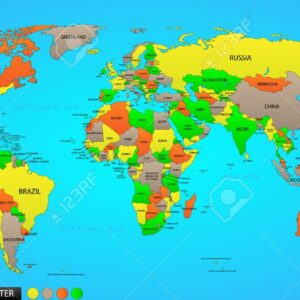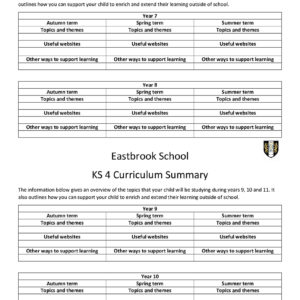Welcome to Geography at Eastbrook School! The geography department uses the notion of space and place to ensure our learners become principled, resilient, determined, nuanced individuals who are conscientious problem solvers of the 21st century. The geography department not only teaches the planet of the past and of contemporary times but more importantly about what it may or may not be like in the future to come. The geography department utilises the relevance for our learners and provides sustainable and open-minded ideals. Our learners are equipped to enquire about the human and physical processes that shape our planet and make predictions based on the current and past processes. Our learners are equipped with literacy, numeracy and graphicacy skills enabling them to analyse and interpret data. In doing so, we hope that our learners will be ready to grapple with an ever-changing world.
Key Stage 3
The KS3 curriculum includes year 7, 8 and 9. Learners will cover the following topics:
Map skills, Rivers, The UK, Brazil, Resource Management, Ecosystems, Tectonic Hazards, Globalisation, Weather, Development, Coasts and Climate Change
Transferable skills and knowledge
- Map skills
- Spatial awareness
- Locational knowledge
- Data collection
- Data presentation (charts and graphs)
- Data analysis & interpretation
- Statistics
- Investigative skills
The geography department as well as the rest of the school are now in a transitional phase, whereby the KS3 curriculum will be extended to a three-year course starting from September 2020. This will be in-line with most schools around the country. The purpose for this change is to enable learners to fully utilise their time studying at KS3 to help them better prepare for KS4.
Teachers of geography will teach topics, skills and virtues which require higher order thinking and maturity from our learners. For example, learners will reflect and question ideas and concepts. There will be more time for teacher-learner feedback and reflection. Topics with complex global issues which require higher order thinking and virtues will be explored. Teachers will ensure that any gaps in our learners’ knowledge, virtues, skills and understanding are covered and repeated if necessary.
The KS3 curriculum aims to better prepare our learners for KS4. The knowledge, understanding and skills required in KS4 have their foundations in the KS3 curriculum. This is to ensure our learners feel acquainted and equipped to deal with the challenges of geography at GCSE. There is more emphasis and coverage of GCSE key terms in KS3. For example, the water cycle taught at year 7 includes key words that are used in a GCSE geography exam. In the KS3 curriculum, there are many topics that mirror GCSE topics in order to prepare our learners for KS4 teaching and learning. For example, topics such as rivers and coasts are taught at Year 7 and 8 which are also part of the GCSE physical geography syllabus.
The geography curriculum provides extended writing tasks to develop critical thinking, analysis and evaluation of concepts in geography. For example, learners in year 8 write an essay about the Fukushima nuclear disaster in Japan. The aim is to promote and link whole school literacy with other subjects. This will build crucial literacy skills and discourse particularly extended essays building resilience for a rigorous KS4 curriculum.
By the end of KS3, learners will possess the core knowledge and understanding of key physical and human processes to help them make observed conclusions. Learner will undertake many tasks whereby they are encouraged to derive advantages and disadvantages or scale-based points to geographical processes. Learners will make deductive conclusions on sustainable approaches in the domains of social, economic and environmental issues. Learners will develop the ability to evaluate their answers and to think critically on social, economic and environmental issues. They will learn to deal with alternative viewpoints and consider other opinions on topical issues whilst developing critical thinking skills. Our learners will develop character virtues which will enable them to create an informed opinion on the topics they study and beyond.
By the end of KS3, our learners are expected to have secure knowledge and understanding of human and physical processes in the context of local, national and global scales. They are also expected to have sound virtues alongside graphicacy and numeracy skills as set out in the national curriculum framework. This will form the basis for wider learning whether it is geographic or for other disciplines. By the end of KS3, we expect our learners to be ‘KS4 ready’. This means that all learners are capable of higher-level academic studies in any given discipline. Learners would also possess virtues that will help them access higher level curriculum at KS4. In Addition, learners who wish to take geography at KS4 have solid foundations of the subject to ensure rapid growth of their knowledge, skills and understanding.
Key Stage 4
The KS4 curriculum includes year 10 and 11. Learners will cover the following topics:
Tectonic Hazards, Weather Hazards, Climate Change, UK Landscape, Rivers, Coasts, Ecosystems, Tropical Rainforest, Cold Environments
The Urban World, Urban Change in the UK, Sustainable Urban Development, Population, Newly Emerging Economies, Resource Management (Food, Water & Energy), Physical and Human Fieldwork investigation
Transferable skills and knowledge
- Map skills
- Spatial awareness
- Locational knowledge
- Economic Knowledge
- Data collection
- Data presentation (charts and graphs)
- Data analysis & interpretation
- Statistics
- Mathematical formulas (e.g. velocity)
- Investigative skills
By the end of KS4, learners are expected to be well informed individuals who are competent in working independently. They have used prior learning at KS3 to build and strengthen their academic achievement and virtues. Learners become equipped to construct and deconstruct arguments using theoretical knowledge and evidence to provide a critical opinion on all KS4 topics. Learners can distinguish countries based on its economic development, particularly countries that are globally or regionally significant. Learners will be adept in making judgments using social, economic and environmental indicators even though they may not have studied a particular place or location. This will therefore demonstrate the knowledge and understanding of learners and the ability to use transferable knowledge and skills to make judgements on places with similar set of circumstance to which they have studied.
The KS4 geography curriculum allows learners to develop elaborative literacy skills. Learners will be using techniques such as ‘PEE’ (Point, Explain and Example) and geography specific ‘SEE’ (Social, Economic and Environmental) acronyms for support. Geography teachers model elaborative questions verbally and in writing, where deep thought and specific terminology is required. The objectives in modelling answers, is to develop confidence and provide support to encourage learners to improve literacy. Learners are often provided with mark schemes and grading criteria. This allows learners to aim for higher levels of literacy using the desired marking criteria.
Teachers take every opportunity to teach beyond the scope of the syllabus. For example, discussing hydrogen fuel cell technology or international political affairs enable learners to better understand the world they live. There are other instances throughout the year when it is pertinent to discuss topics beyond the GCSE syllabus. For example, the slave trade or the Holocaust and the two world wars are crucial in understanding the contemporary world of today.
By the end of KS4, learners have in-depth knowledge, understanding and skills appropriate for KS4. Learners have a wide repertoire of literacy skills to communicate their point of view coupled with niche geographic terminology. They continue to develop their decision-making skills whereby informed choices are made about society, environment and the economy. Learners are aware of the positive and negative impacts of choices that humans make. Thus, they understand and can explain the complex inter-relationships that exist between humans and the natural world. They become adept in evaluating these choices based on informed and evidence based theoretical geographic knowledge.
Learners are therefore ‘KS5 ready’, in a strong and confident position to continue their studies onto KS5 or other forms of training and employment.
Curriculum Enrichment
- A weekly geography quizzes and games
- Fieldtrips – Epping Forest, tech and business parks, Southend beach
- Afterschool revision sessions (particularly for GCSE learners)
- Creating volcano models
Homework
- Homework is regularly set to supplement and extend the learning of the classroom
- Learners are expected to revise on a regular basis which does not form part of the homework task.
Career Opportunities
- Data Analyst – Office for National Statistics, NHS
- Civil Servant – HM Government
- Cartographer – Google Maps, Ordnance Survey (OS Maps), Apple Maps, ARC GIS etc.
- Academic – University, Schools and Colleges
- Environmental Scientist – Environment Agency, DEFRA
- Geologist – BP, Shell, Aramco, British Geological Survey
- Entrepreneur – Sky is the limit!
- Politician – UK PM (Former Prime Minister Theresa studied geography at Oxford university)
- Banker – HSBC, Barclays, JP Morgan, Bank of America, Citi Group etc.
Exam Boards
Exam board Course title Specification code Year of examination
OCR B Geography (Geography for enquiring minds) J384 2021
AQA Geography 8035 2022 onwards
Support for exams
KS3
- BBC Bitesize app (mobile and tablet): https://www.bbc.co.uk/bitesize/articles/zgd682p
- BBC Bitesize website: https://www.bbc.co.uk/bitesize/subjects/zrw76sg
- https://www.3dgeography.co.uk/
- https://www.natgeokids.com/uk/category/discover/geography/
- https://www.ordnancesurvey.co.uk/mapzone/map-skills
- https://www.geographyalltheway.com/ks3_geography.htm
- http://www.coolgeography.co.uk/
KS4
- BBC Bitesize app (mobile and tablet): https://www.bbc.co.uk/bitesize/articles/zgd682p
- BBC AQA GCSE Bitesize website: https://www.bbc.co.uk/bitesize/examspecs/zy3ptyc
- BBC OCR B GCSE Bitesize: https://www.bbc.co.uk/bitesize/examspecs/zpsx2p3
- https://www.ordnancesurvey.co.uk/mapzone/map-skills
- http://www.coolgeography.co.uk/
- https://www.s-cool.co.uk/gcse/geography
- https://revisionworld.com/gcse-revision/geography
Past Papers
AQA GCSE Geography – Exam papers
Paper 1: https://filestore.aqa.org.uk/resources/geography/AQA-80351-SQP.PDF
Paper 1 Insert: https://filestore.aqa.org.uk/resources/geography/AQA-80351-SIN.PDF
Paper 2: https://filestore.aqa.org.uk/resources/geography/AQA-80352-SQP.PDF
Paper 3: https://filestore.aqa.org.uk/resources/geography/AQA-80353-SQP.PDF
Paper 3 Resource Booklet / Pre-release: https://filestore.aqa.org.uk/resources/geography/AQA-80353-SIN.PDF



